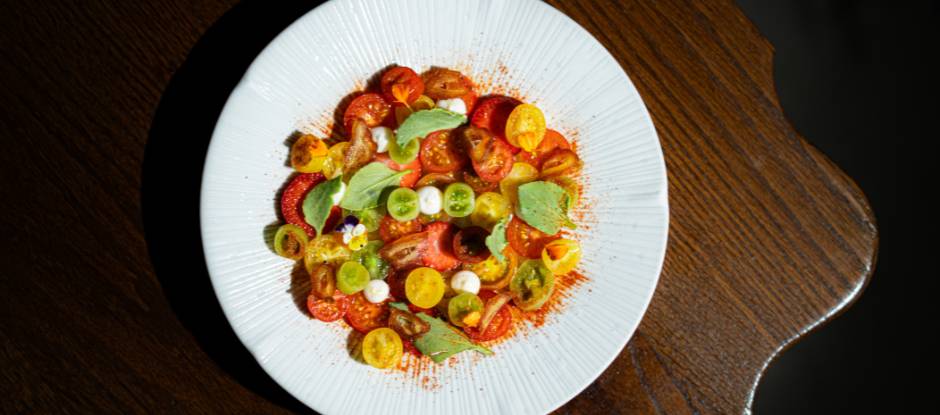From the bottom line to the business cards, you have to rethink everything, explains Omar Shihab, founder of Boca.
Greenwashing may be rife, but it’s not on the menu at Boca, a sleek Spanish restaurant in Dubai’s financial district. More than fuzzy, feelgood ideals, it’s numbers and facts that count here, weighed up with clear-eyed precision. Founder Omar Shihab can describe the provenance of the excellent oysters on your plate and the salty desert shrub in the dressing, but he can also tell you how much waste his team produced last week, month and year (to the gram, if you like).
It’s not what you might expect in Dubai, known more for its conspicuous consumption – though dig a little deeper, and change is unquestionably afoot. There is, says Shihab, some “incredible” work going on, running from farming start-ups to large-scale research projects, looking at salt-resistant crops or growing quinoa in the desert. It’s work he believes could prove crucial in the years to come.
“In a way, living and producing food in the UAE is like living in the future. With climate change accelerating, many regions around the world are now facing the same harsh conditions, and we might actually be shaping the blueprint for the future of food production.”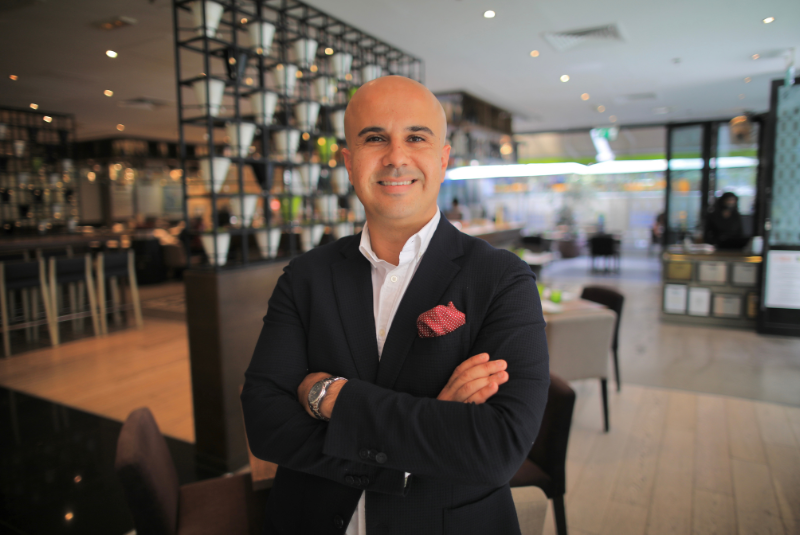
Restaurateur Omar Shihab founded Boca in Dubai more than 10 years ago
If you’d care to know more, take his business card, stamped on an old menu: Boca is, after all, a place where very little is wasted. No wonder it’s scooped the Sustainable Restaurant Award 2025, as part of the Middle East and North Africa’s 50 Best Restaurants, as well as winning a Michelin Green Star. We caught up with Shihab to talk foraging, the future of food, and why, no matter how green you are, hospitality has to come first.
Desert foraging and futuristic farming
When Boca opened in 2014, the team looked to the coast for ingredients – which makes perfect sense, given that Dubai was once a fishing village. They found a rich array of local seafood in the Arabian Gulf and Indian Ocean, even avoiding certain species like the prized but over-fished hammour (if it’s been served at Boca of late, that’s because it’s now being farmed sustainably).
Dibba Bay oysters are another standout on the menu, successfully raised in the warm waters of the Gulf by a pioneering producer. “They grow in open water, with a delicious balance of sweetness and salinity and a beautiful texture,” says Shihab.
What could be gleaned from the land was less obvious, in a place where rain is a rarity and spades encounter sand, not soil. “The reality is that we live in a desert, with less than two per cent of arable land in the country,” explains Shihab. “On the surface that might suggest scarcity, but it’s really a call to look beyond what’s immediately visible.”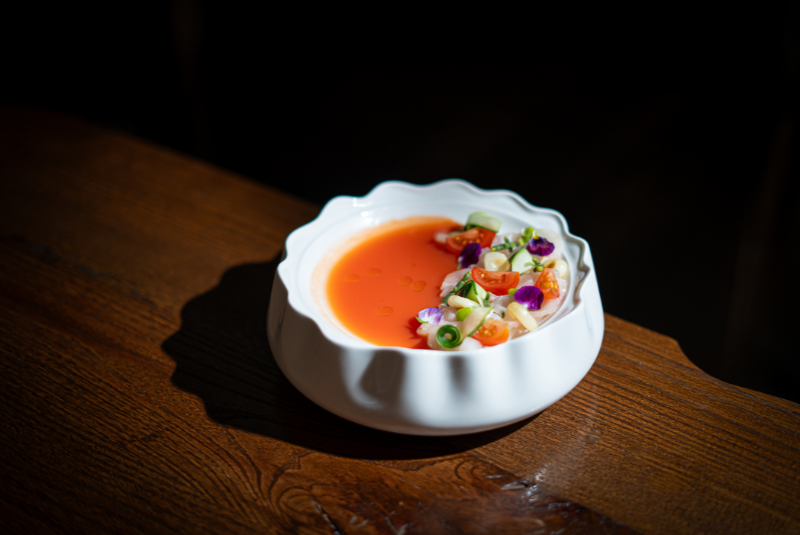
Boca's kingfish with spicy local tomato gazpacho, broad beans, corn, salicornia and cucumber
Indigenous plants are a good example. “Growing up in the UAE, I remember how, after the rainy season, we’d go into the desert to look for certain leafy greens and shrubs. Foraging is also exciting to us, because it fosters a deeper connection to the land.” Often-overlooked plants and herbs are woven into Boca’s menus, whether it’s bitter-tasting khansour from the mountains, added to a pisco cocktail, or salty seedaf leaves, used in a signature salad.
And locally farmed produce? That’s increasingly on the menu too; a seismic shift in a country that imports more than 80 per cent of its food. Out of necessity comes invention, and the region’s tough terrain and lack of water have spawned some ingenious solutions. They include Below Farm’s lion’s-mane mushrooms, raised on discarded date-palm leaves, and the heirloom tomatoes produced at Al Ain in pesticide-free, hydroponic farms (which make a great gazpacho, confirms Patricia Roig, the restaurant’s Sevillian-born executive chef).
Why accountability matters
Sourcing is, of course, just part of the bigger picture at Boca, whose 31-page Sustainability Manifesto considers every aspect of the business, from what happens to leftover pineapple skins (they’re turned into sodas, FYI) to the uniforms worn by staff, made from biodegradable hemp. Water is filtered and bottled in-house; cooking oil converted to fuel; and the restaurant runs on renewable energy – and has the certificate to prove it. 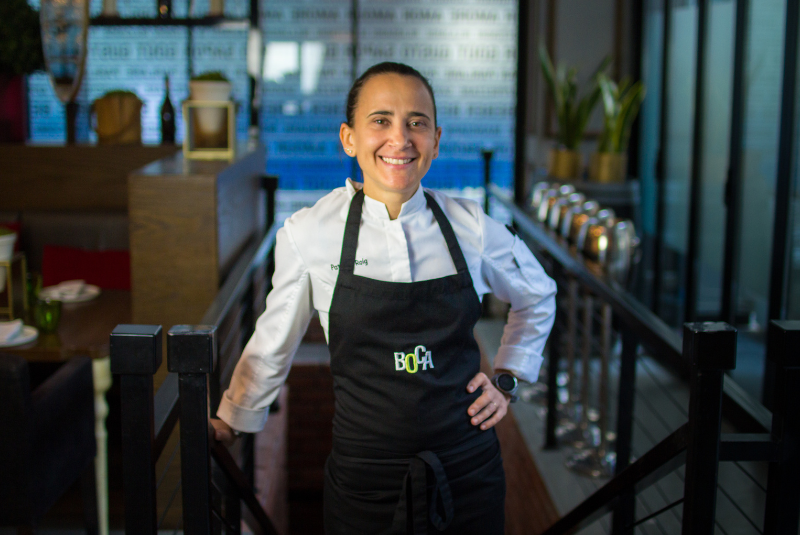
Patricia Roig is the executive chef at Boca
What’s perhaps more unusual is the focus on accountability, down to weighing and logging every ounce of waste produced over the last five years: “A low-tech approach, but a gamechanger,” according to Shihab. He has also opened the business up to outside scrutiny, and publicly shared the findings.
“Greenwashing is a major issue,” he points out. “We wanted to ensure that the steps we take are genuinely impactful and verifiable.” That’s meant a three-year-long independent audit to calculate carbon emissions, along with a Food Made Good evaluation, which awarded them the top three-star rating.
The greatest challenge, he says, came from within: making sure that every member of the team was unreservedly on board. “Before we could push for change externally, we had to ensure that everyone understood and believed in our shared purpose. That’s what I believe sustainability is all about: understanding what we can change, within our power and reach.”
Finding the right balance
If all this entails an epic amount of extra work and effort, it’s not necessarily something that guests are aware of. In Shihab’s estimation, less than one in five customers choose to eat at Boca because of its sustainable ethos. Does that bother him? Not in the slightest, he says.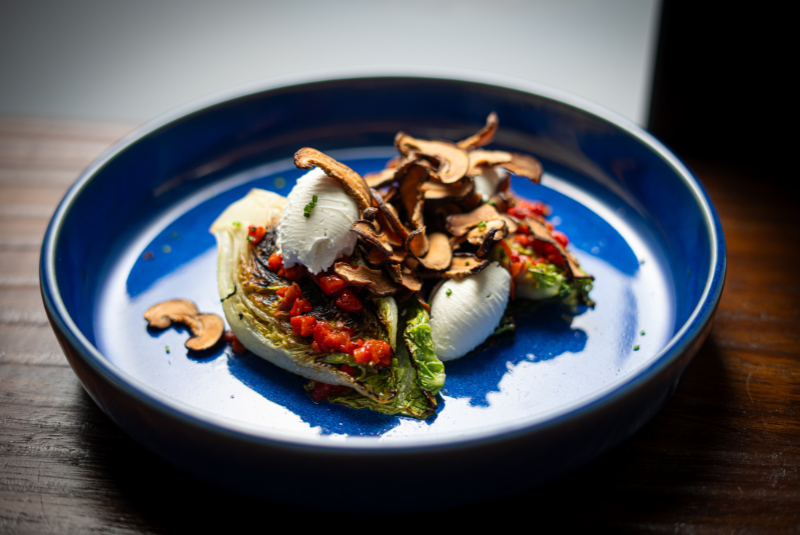
Camel cheese with baby gem, piquillo peppers and crispy shiitake
If guests are curious, there are QR codes and details on the menu, and staff can answer any questions: if not, that’s fine too. “First and foremost, we’re in the business of hospitality. Our primary promise is to deliver a delicious meal in a beautiful setting, with great service and hospitality. Running a responsible operation behind the scenes? That’s a choice we’ve made.”
While Boca has come a long way, it’s a process Shihab sees as a journey – and one with difficult questions and decisions along the way. Beef still sometimes appears on the menu, albeit exactingly sourced, as do imported ingredients and wines (often biodynamic or organic). It’s part of a high-wire act that has enabled the restaurant to survive – and thrive – in Dubai for more than a decade.
“For a business to be truly sustainable, it must balance three key pillars: people, planet and profit,” says Shihab. “If we fail to sustain the commercial aspect, we lose the ability to create a platform for meaningful change. Ultimately, our approach is about making the best decisions possible within our current context.”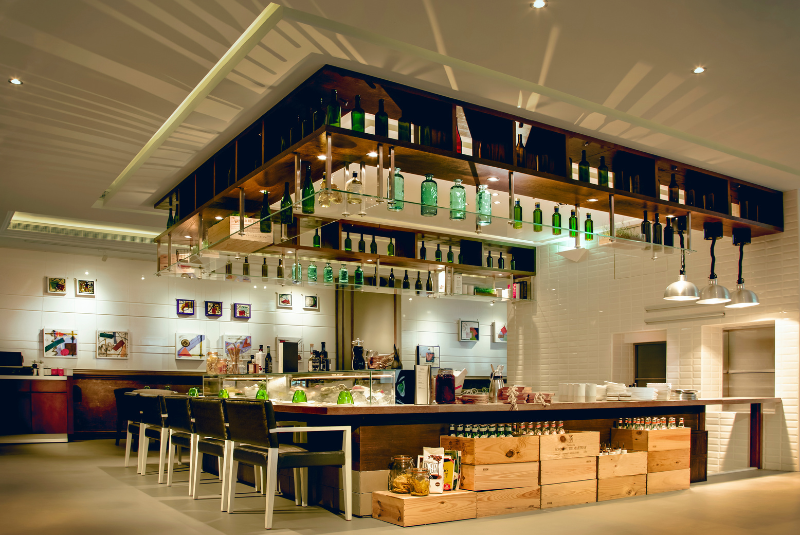
Shihab believes there's always more work to do on improving sustainability
What’s next, he hopes, is continuing the work and potentially building a brand-new space. Naturally, sustainability will be at its core, with a test kitchen, garden, restaurant and tasting room, designed as a closed-loop, circular system.
“That’s my ultimate vision: to take everything we’ve learned about running a responsible and conscious operation and apply it to a blank canvas. Rethinking every aspect from the ground up, to create a space that truly reflects the work that’s happening here.”
The Sustainable Restaurant Award is given to the restaurant in the region that achieves the highest environmental and social responsibility rating as determined by 50 Best’s audit partner, the Sustainable Restaurant Association. Discover the full list of the Middle East & North Africa’s 50 Best Restaurants 2025.
